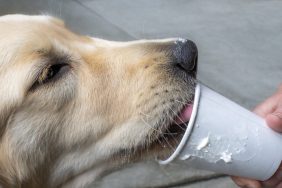
Can Dogs Eat Sour Cream? Is Sour Cream Safe For Dogs?
The short answer is yes, sour cream is safe for dogs to eat in moderation. However, sour cream is a dairy product that contains lactose, so lactose-intolerant dogs should always steer clear.

The short answer is yes, sour cream is safe for dogs to eat in moderation. However, sour cream is a dairy product that contains lactose, so lactose-intolerant dogs should always steer clear.

Can dogs drink milkshakes? You may be asking this because you want to share a delicious dessert with your furry friend. Humans can drink milkshakes, so are they also safe for dogs to drink?

There is no easy yes or no answer to whether dogs can eat goat cheese safely. It’s not technically considered toxic for dogs, unlike blue cheeses, which should be avoided. However, goat cheese could also aggravate dogs who suffer from lactose intolerance. It’s best to consider goat cheese as an occasional, small treat for your dog rather than part of their regular diet.

There is no short yes or no answer to whether dogs can eat mozzarella cheese safely. It isn’t technically toxic to dogs, unlike blue cheeses, which in general should be avoided. However, mozzarella cheese may upset dogs who have lactose intolerance. Additionally, even though mozzarella is lower in fat than some other types of cheese, it really shouldn’t be used as much more than a treat for your dog.

You may have seen cute videos online of dogs joining their humans at the Starbucks drive-thru and getting a tasty-looking Puppuccino. But what exactly is a Starbucks Puppuccino, and is it safe for dogs?

Can dogs eat blue cheese? Maybe you’ve wondered if you could share some with your dog while crumbling blue cheese into your lunchtime salad or cutting some slices for a grilled cheese sandwich. If humans can eat blue cheese, can dogs safely eat it too?

Figuring out whether Swiss cheese is okay for your dog to eat might feel like stepping into a minefield. After all, there are thousands of varieties of cheese, some of which are bad for dogs. Fortunately, this type won’t leave your canine friend in the ICU.